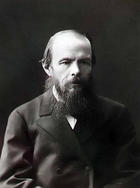
Unofficial or heterodox thought, rarely found in Russia another way of expression than the literature. Only in the realm of fiction expression is tolerated some ideas and sentiments not audited by the power, be it political or ecclesiastical.From this point of view can interpret the work of Dostoevsky, a writer who, through their work, try to meet their spiritual and religious, metaphysical and ethical, psychological and social questions. So, if we accept the idea that the Russian thought is, as George Steiner, fundamentally religious says, the work of Dostoevsky can be read as an attempt to express this thought in themselves, literary terms, that is embodied in arguments, characters, dreams and, above all, dialogue. So that, leaving aside the actual formal literary dostoyevskiano Wireless tissue outside the prodigious ability to drag the reader towards the psychic and passionate adventures of his characters, in regard to the author's message -first order of esters, it can be said that the work of Dostoevsky is the expression of a constant philosophical reflection about freedom. But perhaps most striking about this author has created a work that, following its consistent ideological road in the secularization of religious thought comes, paradoxically at the same starting point, to Christian orthodoxy, a Christian idea that man finds meaning to their existence in the revealed truth, ie the unchanging message of God interpreted by the Church. If, for example, White Nights (1848), one of his first novels can be read as a passionate exaltation of human kindness, The Karamazov (1880), the last work of Dostoyevsky, brothers we come to discover that we are all guilty or, in any case, we are all responsible for our acts much like those of others. The reflection on human freedom, the foundation of our being, leads us always from the perspective of Dostoyevsky to the need to freely accept the divine law, the mandate of the faith, the Catechism of the truth, or, what is the same, to deny free to be free.Born in Moscow in 1821, the son of a doctor, Fyodor Dostoyevsky felt suddenly possessed by a powerful literary vocation. His deep religious sentiment led him to become interested in the "humiliated and offended" and social reforms, attitude earned him long years in prison and deportation to Siberia. In recent years a radical change occurs in his vision of man and the world. Returned to St. Petersburg in 1860 restarts his literary career, activity in which, despite the complaints and difficulties, continued until the end of his life, in 1881.Dostoyevsky's work can be divided, as its ideology, in two periods, separated by the sentence. The first learning and entered a Christian socialism, with works like Poor Folk (1846) or White Nights (1848), and the second with his great novels Crime and Punishment (1866), The Idiot (1868) Demons (1872), The Brothers Karamazov (1880) and the colossal Diary of a Writer, in which the writer shows us in all its grandeur and psychological depth, as well as its contradictory and rich prophetic character




